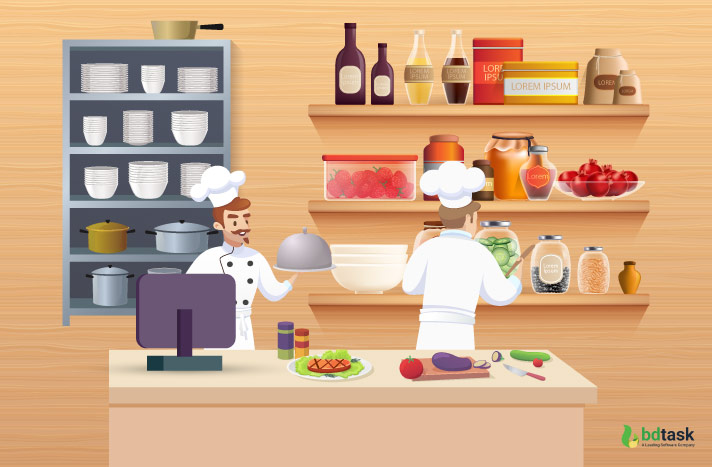Importance Of Inventory Management In Food Industry

Almost every industry now, big or small, maintains a warehouse, which in other ways is called an “inventory storage room”. And to maintain this inventory storage room, you can use automated, time-efficient, and organized inventory management software.
The importance of inventory management in food industry is huge, as food is a perishable item and has different parameters to maintain raw ingredients. For instance, the fear of overstocking or understocking, sudden declination of demand for certain items, ensuring the freshness of every item, and the tension of reducing waste.
Nonetheless, adopting the right inventory management system for your warehouse can assist you to run your warehouse service, smooth supply chain, on-time delivery, and the perishability of raw ingredients.
In this blog, I not only will talk about the importance of inventory management in food industry but also share some solutions on “how it can erase all your warehouse-related problems.
What Is Restaurant Inventory Management?
Restaurant inventory management software is an automation system, which now takes over all the work. that used to happen manually. In easy language, restaurant inventory management is a tracking device, counting “what” and “how much quantity” of inventory is being used in the kitchen in “what item” and in “what quantity” per day.
And using those data, a restaurant owner can draft his everyday inventory chart, for instance, improvising the regular inventory purchase, minimizing the percentage of wastage, and maximizing the profit margin. With a smooth, intuitive, efficient, and automated restaurant inventory management, a restaurant owner can track:
- What inventory do you purchase at what price
- Quantity of inventory used every day
- Quantity of inventory left at the end of the day
An In-Depth Analysis: Importance Of Inventory Management In Food Industry
The role of an inventory management system in your restaurant will not only be limited to your warehouse but also has many other advantages too. Only this automated restaurant inventory management can help a restaurant owner to get an automated generated mathematical amount so that you can understand the correct portion that should be used in a dish.

As a result, your restaurant can manage enough stock for all customers, without less raw inventory wastage. All restaurants should do an effective practice of inventory management.
A genuine inventory management software helps you reduce the food or raw material wastage, co-operate with vendors, decrease the cost of goods sold, maximize profit, and higher customer satisfaction. I have listed down some of the importance of inventory management in food industry:
- Reduce The Food Wastage
- Lower The Cost Of Goods Sold
- Vendor Management
- Automatic Inventory Supply
- Higher Customer Satisfaction
- Profit Maximization
How Do You Calculate The Restaurant Inventory?
This inventory calculation totally depends on the square size of your restaurant, the table size, and the food item you’ll offer. Six parameters are recommended by the giant restaurant owners:
- Create an inventory table of five columns across the top
- List down the ingredients/item you’ll put in your warehouse
- Record the unit price for each item
- Inventory count (x) unit (x) market price
- Apply “as per inventory sheet”
How To Use Inventory Management In Your Restaurant?
Since food is a perishable item and has a very short shelf life. Hence it’s a kind of troublesome process if any restaurant owner wants to track and trace each and every item manually. After all, the food industry is a highly regulated industry, you need to keep all your inventory in regular observation, maintain the health/freshness standard and remove or use it before it gets old or generates any health hazard to your consumers.
As a restaurant owner, you need to understand how important “inventory management” is in your restaurant. Here are some essential tips for using inventory management in your restaurant:
- Adopt an efficient and smooth inventory management system
- Keep a dedicated group of staff to do inventory
- Track inventory on a regular basis or apply a cycle counting policy
- Create a brief plan for your inventory management
- Maintain a waste-food chart
- Maintain first expiry, first-out system (FEFO)
- Follow the trend and try to maintain an automated inventory warehouse
You May Also Like: Fast Food Restaurant Business Plan Sample Guide
5 Common Terms For Restaurant Inventory Management In Food Industry
Only the experts know this term, and if you already have or want to maintain a restaurant inventory management in the future; then you also have to know these terms given below:
- Sitting inventory: The total quantity of raw material/ inventory has “on hand”. Can be measured in currency value or unit of measurement.
- Depletion: The dollar value of the assets or products that your restaurant uses at a specific time. Depletion can be calculated daily, weekly, monthly, or yearly.
- Usage: Assume an estimate of “how long a certain raw material can be used”. You can calculate the usage of raw materials as “sitting inventory” of a product divided by the depletion rate of that product.
- Variation: Calculated as a percentage. The difference between of depletion of a product and how much you sold.
- Yield: Written in ratio. Amount of product sold: amount actually used
Don't You Wanna Know!!
How Can You Efficiently Manage Your Restaurant Inventory?
Now, I'm going to share 8 crucial tips for operating restaurant inventory management.
- Calculate the recipe cost: Analyze the cost, based on the price and precise amount of each ingredient
- Menu construction: understand and evaluate the popularity of each item on the menu, considering an estimated cost per item. As a result, not only you can understand the approximate price, but also can estimate the sales rate per item.
- Use a surplus food strategy to avoid wastage: if you accidentally left with a large number of inventories, tell your chef to cook some special appetizer with the main dish.
- Maintain a regular routine of tracking inventory every day: maintain a consumption excel sheet, so that you can track what ingredient is being used in what item and in what quantity.
- Balance out the performance and profitability: maintaining high performance and high profitability can help you to keep your restaurant business stable.
- Monitor daily sales tracking: yes, it’s kind of difficult to keep track of ingredients but you can record the per day sale of each item using the restaurant POS billing system.
- Cover your restaurant pantry with proper surveillance: proper monitoring and recording are absolutely necessary for your inventory because most of the time employees use kitchen pantries' food to complete their meals and later put blame on customers. Hence proper surveillance is absolutely necessary for your kitchen inventory.
8 important Practice For Restaurant Inventory Management In Food Industry
Honestly, it’s a very big challenge to maintain an inventory in an efficient way, especially in the food industry, because it involves perishable items.
There are many tasks involved in managing or organizing the stocks, for instance, stock expiry management, inventory that is about to finish, and organizing the raw ingredients. Here, I’m going to share the best 8 practices for maintaining restaurant inventory:
- Put a small level on every shelf, so that staff can easily find any material
- Keep your stock low, so that you can serve fresh food to customers
- Monitor the sell rate of each specific item
- Track the usage of each ingredient on each item
- Assign two dedicated employees for inventory maintenance
- If necessary; train your dedicated employees on “how to track the inventory?” and “how to use the POS system in your warehouse?”
- Automate your warehouse with an auto-reordering system
- Based on the seasonal trend, you can forecast the demand for certain raw material
3 Special Reasons
Importance Of Inventory Management In Food Industry
An inventory management system plays an important role in your restaurant business. It helps your business to think strategically, is cost-efficient, easy to track the shelf life, and reduces wastage. Now I'm going to share 3 special reasons and help you understand “why the inventory management system is so important in the food industry?”
- Reduce Wastage Of Raw Ingredients: With this inventory management system, you can easily record and track the weak area; where the wastage is happening and can improve that specific area. Besides, it can track data such as quickly rotten ingredients, dropped food, leftover foods, etc.
- Steady Pricing: You can keep your menu price stable, only if you can strategically maintain and track the expiry of your raw material and can reduce wastage.
- Consistency: With a powerful inventory management system, you can easily main a stable quality control, and also ensure the health and fresh food for your customer, no matter what location they choose
Conclusion
Above, I have described the importance of inventory management in food industry. The main goal of every restaurant is to maintain and serve fresh food to their customers. And you as a restaurant owner, always need to balance or prevent being overstock or understock, make sure all your inventory needs to be sold before it reaches the expiry date.
Read Also











